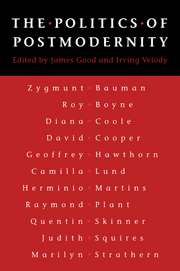Part II - The critique of modernist political thought
Published online by Cambridge University Press: 05 June 2012
Summary
Historically, political theorists have sought out the foundations of political principles in various areas: theism, the idea of a natural order, philosophy of history, a conception of human nature and a theory of the self, and the undiscoverable laws of reason. In the opening chapter of this section Raymond Plant lays out the basis of modernist political theory and political philosophy showing how problems internal to its own development result in antinomies and paradoxes which have made the general undertaking difficult to sustain. He explores the logics of communitarianism and liberalism and their unassimilable counter-claims, and does this by employing a wide range of resources but particularly those of Wittgenstein and Lyotard.
In Plant's final focus on the the self, as treated in the discussions of communitarian and liberal theorists, he notes how communitarians reject the liberal theory of the encumbered self on the grounds that it is both sociologically false; and also, in Wittgensteinian terms, philosophically false. On the other hand, Plant shows that communitarians themselves are pretty unclear about the relation between the self and its values and ends, in part because they make claims about universal features of the self.
In the end Plant espouses a left Hegelian position which sees a role for theorising universal features of human life and reasons for action based upon them, while allowing that what fills in these universal features must depend on contexts and social meanings. As with Habermas, Plant sees a role for both the general and the particular in a revitalised political theory.
- Type
- Chapter
- Information
- The Politics of Postmodernity , pp. 73 - 75Publisher: Cambridge University PressPrint publication year: 1998



